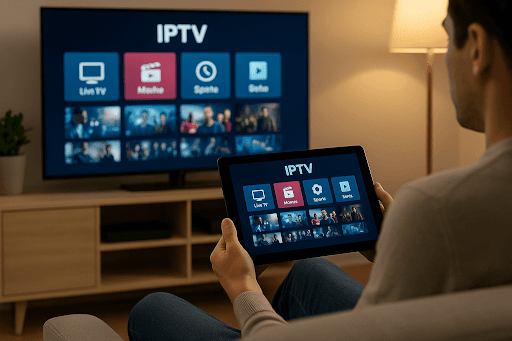IPTV vs. Traditional Satellite and Cable: Pros, Cons, and What’s Next

Television has come a long way in the past few decades. From bulky CRT TVs and basic antenna channels to digital satellite and now internet-based streaming, the way we consume entertainment has transformed entirely. One of the most talked-about developments is IPTV – short for Internet Protocol Television – which offers a modern, flexible alternative to traditional satellite and cable services.
In this article, we’ll explore the differences between IPTV and traditional TV, weigh the pros and cons of each, and look at where home entertainment is heading next. Whether you’re curious about switching or just want to understand the trend, this guide breaks it down in simple terms.
IPTV stands for Internet Protocol Television. Unlike satellite or cable TV, which delivers content through physical wires or dishes, IPTV streams television content using the internet. All you need is a stable connection and a compatible device to access a wide range of channels, movies, and series.
There are many IPTV providers in the market, and services vary in quality and features. One of the key reasons people choose IPTV is the ability to watch content on multiple devices, including smart TVs, smartphones, tablets, and PCs. If you’re new to the concept and considering a subscription, you can explore options to iptv kopen and get started without complicated installations.
How Satellite and Cable TV Work
Traditional satellite and cable TV rely on physical infrastructure. Satellite dishes capture signals beamed from space, while cable uses coaxial wires to bring the feed into your home. These systems have been reliable for decades, offering scheduled programming with limited interaction.
They do, however, come with some downsides. For example, most providers lock customers into long-term contracts, charge installation fees, and require specific hardware like decoders or set-top boxes.
IPTV vs. Satellite & Cable: A Clear Comparison
Let’s compare IPTV with traditional systems across key categories:
Cost and Flexibility
IPTV usually comes with lower costs and more flexible plans. You pay for what you need and often have the choice of monthly, quarterly, or yearly subscriptions. Cable and satellite services often bundle channels, leading to higher monthly bills and long commitments.
Device Compatibility
One of IPTV’s biggest strengths is its compatibility with various devices. Whether you use a smart TV, mobile phone, tablet, or PC, you can access content using the beste IPTV app. In contrast, traditional TV usually requires a fixed setup involving hardware and cables.
Content Variety
IPTV platforms often provide thousands of live channels and on-demand content across different languages and regions. Traditional TV services may offer limited content options, and adding more channels often comes at a higher price.
Viewing Experience
Modern IPTV services support HD and 4K streams, include electronic program guides (EPG), and allow users to rewind, pause, or resume shows. Cable TV offers less interactivity and fewer customization features.
Accessibility and Portability
With IPTV, you can watch your shows anywhere as long as you have internet access and the right app. Satellite and cable, on the other hand, are tied to specific devices and locations.
To get an idea of the growing trend and local options, you can visit IPTV Nederland and explore how IPTV services are evolving in specific countries.
Pros and Cons
IPTV Pros
- Watch on any device with internet access
- Often cheaper than traditional services
- Huge content libraries
- Supports time-shift and video on demand
- Easy setup with the beste IPTV app
IPTV Cons
- Needs a stable internet connection
- Some services may be unreliable or unofficial
- Occasional buffering depending on your connection
Satellite & Cable Pros
- Reliable signal in most weather conditions
- Familiarity and ease of use for some users
- No internet required
Satellite & Cable Cons
- Higher cost and fewer options
- Contracts and equipment fees
- Less portability and flexibility
Why More People Are Switching to IPTV
Today’s viewers want control. They want to decide what to watch, when, and on what device. That’s exactly what IPTV offers. With rising internet speeds, smarter devices, and improved apps, IPTV is becoming the preferred choice for modern households.
The move towards digital also aligns with broader trends, like cloud storage, mobile-first services, and app-driven experiences. In places where services like IPTV Nederland are gaining popularity, it’s clear that internet-based TV is not just a passing trend – it’s the future.
Choosing the Beste IPTV App
The viewing experience can vary depending on which IPTV app you use. A good app should be easy to navigate, support multiple playlists, display a clean EPG, and be compatible with different screen sizes. Always look for reviews and choose an app that fits your preferences and the devices you use most often.
What’s Next for Home Entertainment?
As more households ditch traditional systems, IPTV is evolving rapidly. Future developments may include:
- AI-driven recommendations
- Interactive content experiences
- Better parental control features
- Deeper integration with smart home systems
Meanwhile, satellite and cable providers may adapt by launching hybrid solutions that combine internet features with legacy systems.
Conclusion
IPTV is not just a modern alternative to satellite and cable – it’s a smarter way to watch television. It offers more choice, greater control, and better value. That said, traditional services still have a place for those who prefer simplicity or lack reliable internet.
As technology advances, the gap between these two worlds will continue to grow. For most people, especially those looking for flexibility, portability, and affordability, IPTV is clearly the way forward.





